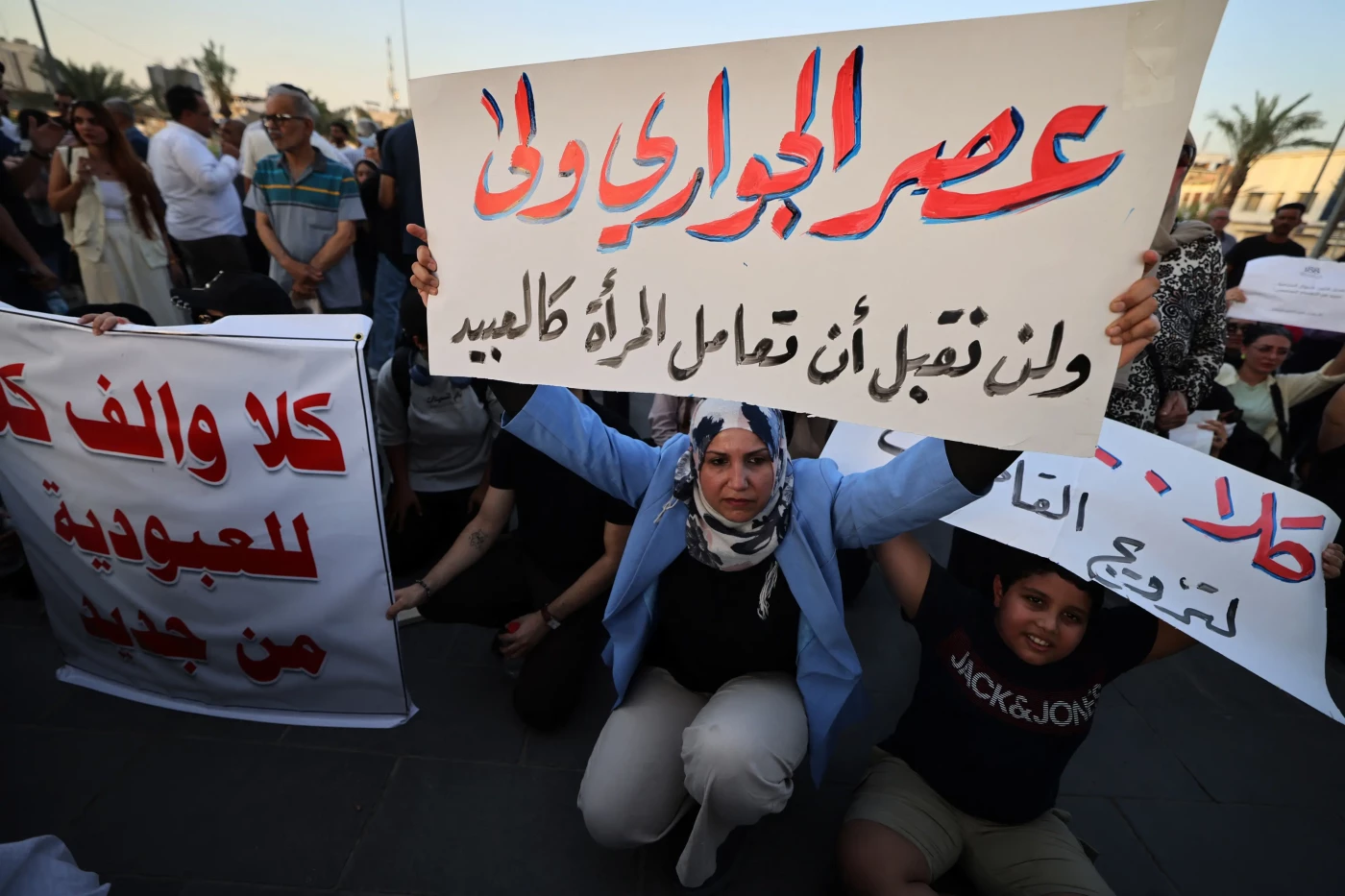BAGHDAD, Iraq - The marginalization of Iraqi women in their homes, on the streets, and even in the law not only continued in 2024, but in fact reached new heights during this year, with unprecedented rates of domestic violence, femicide, and efforts to pass highly-regressive legislations.
Some describe the incidents as isolated, but the numbers tell a different story and warn of looming catastrophes. The recorded cases of domestic violence in 2023 reached 9,000, while in 2024, the recorded cases exceeded 13,000 in the first half of the year alone.
Domestic violence rates have increased compared to the previous year and the one before it. Despite attempts by community police - a law enforcement unit dealing with family related issues and child abuse - to find solutions, they have not been very effective.
“What is mentioned on social media is only a small fraction,” said First Lieutenant Suha Abdul Jabbar, who works in community policing, “some women are fortunate enough to reach us through people, but others living in districts and towns are prohibited from even having a phone or internet access. Our teams cannot reach them.”
She added that community police work requires significant support through laws. Many cases they encounter result in the abuser being asked to sign a pledge not to repeat their actions, but there are no guarantees that they would not be repeated, especially as the perepetrators often threaten these women and confiscate the means through which they had contacted authorities.
Abdul Jabbar also pointed out that most Iraqi provinces, including the capital Baghdad, lack shelters for abused women, except for the Kurdistan Region, which has established three shelters for this purpose.
Some abused women resort to staying in police stations out of fear of returning home. “Some regret deciding to return to their maiden families, as they might get forcibly sent back to their marital homes,” she said, recalling a case of a woman who had to flee to the Kurdistan Region upon learning of shelters there.
Despite the increase in murders caused by domestic violence and ongoing pressure from the United Nations on the Iraqi government to legislate a law specifically addressing domestic violence and establish shelters for survivors, these demands continue to be ignored.
Public outrage tends to be fleeting. Tragic stories involving children, wives, or sisters often trigger intense reactions at the moment, before quickly fading away as soon as the issue is no longer in public discourse.
In a recent case, a father was charged with killing his daughter after years of extended abuse. He initially claimed the daughter had committed suicide, but it was later revealed the father had a long history of abuse, with no deterrent or intervention, even against his deceased wife.
The war against women in the name of “immoral content”
The issue is not limited to physical abuse in Iraq. Many women, particularly social media influencers, met their end due to hate speech and incitement or, at the very least, public trials merely for being women. Whether society agrees with their lifestyles or not, the means used against them highlight the immense hardship Iraqi women endure.
The way social media influencer Ghufran Sawadi, widely known as Om Fahad, was killed in April, underscored the immense danger faced by women in Iraq, according to lawyer Bushra Ahmed.
“While we may disagree with these women’s orientations, the pressure they faced this year only brings disappointment and forewarns an even worse future,” said the lawyer.
The ruling political class has been accused of fueling hate speech under the guise of religion against female social media influencers. Many religious figures have incited violence against these women in sermons and speeches, portraying them as “devils” undermining societal values and morals, leading to "immoral content" campaigns.
The campaigns disproportionally target women and are rarely focused against male influencers.
Before her murder, Om Fahad was sentenced to six months in prison for “undermining modesty and public morality.” She was killed in her car in April by a gunman on a motorcycle in the Zayouna neighborhood of eastern Baghdad.
In the wake of Om Fahad’s killing, many Iraqi influencers took to their platforms in an attempt to protect themselves, swearing they had not promoted immoral content.
This was followed by the arrests of dozens of female influencers, with many others constantly facing threats. The number of male influencers arrested was significantly less.
“This year has been particularly intense for women,” Sara Abdul Wahid, a women’s rights activist, told The New Region, “The real aim of targeting women on social media is to gradually restrict their freedoms through strict controls over photographing and sharing images and videos freely, thereby reducing their personal spaces for expression.”
“The ultimate goal of campaigns like ‘immoral content’… is to tighten control over women and keep them away from the public sphere, an act many activists consider a form of oppression disguised as religion and morality.”
Bushra Ahmed stated that the “immoral content” excuse contradicts the Iraqi constitution as it violates democratic principles and freedom of expression and there are no legal texts justifying it.
Personal Status Law against women
In August, the Iraqi parliament conducted the first reading for proposed amendments to the Personal Status Law. The amendments, which have been strongly criticized by rights organizations and activists, would shift marriage validation from the courts to religious authorities, impacting women's rights, including inheritance and custody.
The bill would allow couples to choose their religious sect - Shiite or Sunni - when entering into a marriage contract. If the couple cannot agree on a sect, the husband's sect would be applied.
“Transferring authority in matters like marriage, divorce, inheritance, and custody from national courts to religious figures, specifically men, takes control away from women and opens the door to conflicting interpretations based on different sects,” said lawyer Salem Ahmed.
In September, UN experts expressed deep concern over the amendments, warning they would significantly roll back fundamental rights for women and children, particularly in marriage, divorce, and child custody.
The bill, primarily supported by male Shiite MPs, is justified by its proponents as a measure to “protect” young girls and reduce divorce rates, but it has faced backlash for potentially legalizing child marriage.
Some sects permit marriage for girls as young as nine years old, and allow unrestricted polygamy as well as temporary marriages, which the current law prohibits. These changes threaten to undermine women’s rights and widen the gender gap in Iraq.
“This was the worst one could imagine for the women of their country, but it happened, and it’s just one part of many atrocities Iraqi women endured in 2024,” Salem Ahmed concluded.



 Facebook
Facebook
 LinkedIn
LinkedIn
 Telegram
Telegram
 X
X


